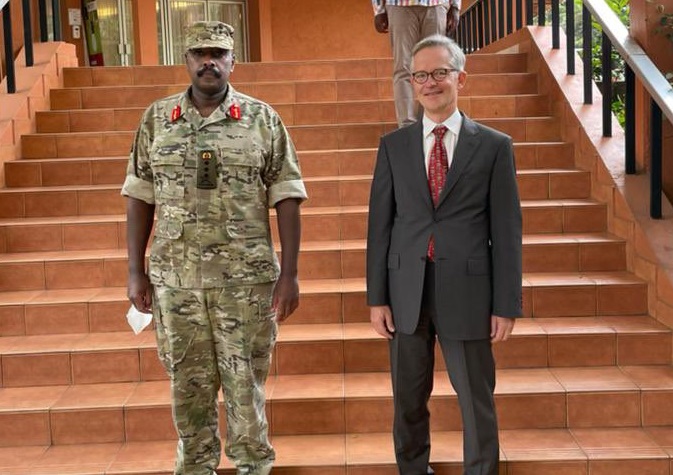In a statement issued on May 23, 2025 by the UPDF Deputy spokesperson Chris Magezi, the army accused the Germany ambassador to Uganda His Excellency Mathias Schauer of un-diplomatic practices through carrying out illegal and clandestine activities that have been taking place in some parts of the Country for some time now.
As the UPDF intelligence pins the German ambassador, there is a worry that other governments could be carrying out similar clandestine operations against the country through social media campaigns against the regime, espionage, financial support to adversaries among others, unless the country’s intelligence agencies confirm the contrary.
According to Julian Assange on page 4 and 5 of his book “When Google Met WikiLeaks,” During the initial stages of the Egyptian revolution, Western political elites had backed Mubarak. US vice president Biden informed the world that Hosni Mubarak was “not a dictator” and stressed that he should not resign.
…..Former UK Prime Minister Tony Blair insisted that Mubarak was “immensely courageous and a force for good.” For Secretary of State Hillary Clinton, the Mubarak’s were “family friends.” But under the surface, a close reading of its internal cable traffic showed that, the State Department had for years bet on horses, supporting and co-opting elements of Egyptian civil society even as it helped to keep Mubarak in power. The Egyptian civil society was to be at the center of the Egyptian revolution that overthrew Mubarak’s regime. This is not far different from the UPDF accusations against the German ambassador.
A series of questions arise about the diplomatic fallout between the UPDF and the German ambassador: whether the ambassador was using his personal funds to fund the said actions or is it from the German mission’s budget, and whether the Federal government in Berlin will take any actions about this revelation? These are diplomatic questions between Uganda and Germany.
It should be noted that clandestine and covert activities between countries always occur during election cycles. The election periods give fertile grounds for states to carry a wide range of clandestine activities against unfriendly governments through propaganda and dis-information campaigns, election interference, violence, military coups, demonstrations and uprisings among others, given the relative low cost of carrying out clandestine election interference in the digital age.
In many cases in Africa, governments have been overthrown on the eve of their election victories either by military coups or uprisings. On 30 August 2023, a military coup occurred in Gabon shortly after the announcement that incumbent president Ali Bongo had won the general election held on 26 August. The coup brought an end to the 56-year-long rule of the father-and-son duo Omar and Ali Bongo over Gabon.
The protests in Sudan started on 19th December 2018 and the long time ruler Omar Bashir was deposed by the military that sided with the people on 11th April 2019. Bahir had won the 2015 elections with 94%. How did the revolution quickly erupt to overpower the 94% who had voted for Bahir 3 years earlier?
On 5 September 2021, Guinea’s Alpha Conde was overthrown by the army less than a year after he had won the election for his third term in office in October 2020 with 59.5%. This was after a constitutional referendum held in March 2020 that reset his two term limits.
Could Uganda and its government be on the verge of being victims to acts of foreign interference in elections, electoral and post-election violence or any other covert actions?
Elections around the world are increasingly subjected to malicious foreign interference, facilitated in part by the rise and increased use of digital tools and social media platforms. Interference can be designed to erode confidence in electoral outcomes and drive political polarization and social tensions during and after the 2026 elections.
One of the challenges in combating this kind of foreign influence operations is that it is increasingly difficult to distinguish between normal campaign activity by official arms of domestic political actors and anti-democratic information operations by foreign governments, dubious commercial entities, or national groups. Populist politicians and parties like NUP have used the same tools and strategies as foreign agents
In my conclusion, is the Ugandan government alert? There are many diplomatic issues associated with the longevity of regimes as we see many of the longest serving governments being overthrown under mysterious circumstances. Could Uganda be the next target?
Richard Byamukama is a lawyer and a security studies expert















